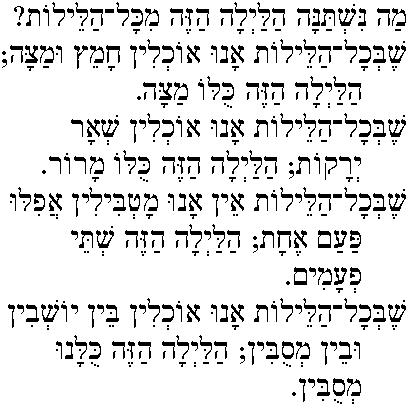

On all other nights, we eat either sitting upright or reclining. Why on this night do we all recline? Sheb'chol haleilot anu ochlin bein yoshvin uvein m'subin halailah hazeh, kulanu m'subin. On all other nights, we don't dip even once. Why on this night do we dip twice? Sheb'chol haleilot ein anu matbilin afilu pa'am echat halailah hazeh, sh'tei f'amim. On all other nights, we eat all vegetables. Why, on this night, maror (bitter herbs)? Sheb'chol haleilot anu ochlin sh'ar y'rakot, halailah hazeh, maror. On all other nights, we eat chametz (leavened foods) and matzah. Sheb'chol haleilot anu ochlin chametz umatzah, halailah hazeh, kuloh matzah. How is this night different from all other nights? Mah nishtanah halailah hazeh mikol haleilot? Living languages: Zulu, Ladino, Judeo-Iraqi, Ukrainian, Navajo, Xhosa, Chinese, Yiddish, Mongolian, Mayan and Mandarin transliteration. Its an incredible collection of multi-lingual Four Questions: a modern Jewish Rosetta Stone.
FOUR QUESTIONS TRANSLITERATION DOWNLOAD

This story begins with the youngest person at the seder asking the Four Questions ( Mah Nishtanah). Jewish Child: "Dad's in a bad mood today.One of the main focal points of the traditional Passover seder is the maggid, the telling of the story of the Exodus from Egypt. The phrase "ma nishtanah" is sometimes used colloquially by some Jewish families in an ironic sense, to express the opinion that some behavior or situation under discussion is not unusual. Commercial Translation is a kind of translation that necessitates types of translators who possess specialized skills, like knowledge of the business jargon, and the industry to which the business belongs. Much of the seder is designed to fulfill the biblical obligation to tell the story to your children, and many of the customs that have developed around the four questions are designed to pique a child's curiosity about what is happening in order to hold their attention. The four questions are traditionally asked by the youngest person at the table that is able to do so. One of the current tunes widely used for the Ma Nishtana was written by Ephraim Abileah in 1936 as part of his oratorio "Chag Ha-Cherut." Current text English Ultimately the question of reclining was maintained, in part to create a parallelism between the number of questions and the other occurrences of the number four in the hagaddah. The Rambam and Saadia Gaon both add a new question to the liturgy to replace it: "why do we recline on this night". As the paschal sacrifice was not eaten after the destruction of the temple the question about the meat was dropped. The version in the Jerusalem talmud is also the one most commonly found in manuscripts. The Babylonian talmud quotes four questions - why matza is eaten, why maror is eaten, why meat is eaten exclusively roasted, and why food is dipped twice. (The last question is a reference to the paschal sacrifice which was fire roasted). The Jerusalem talmud only records three questions - why two foods are dipped, why matzah is eaten, and why meat is eaten exclusively roasted. The questions originate in the mishna, but are quoted differently in the Jerusalem and Babylonian Talmuds. The questions are included in the haggadah as part of the Maggid (מגיד) section. In English, it is referred to as "The Four Questions." Traditionally, the Four Questions are asked by the youngest child at the table who is able. Called "ma nishtanah" in Hebrew, meaning "What has changed?", is taken from the first line of the song. Ma Nishtana ( Hebrew: מה נשתנה) are the four questions sung during the Passover seder.


 0 kommentar(er)
0 kommentar(er)
